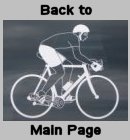
Where's Joe?
Indiana, Illinois, Wisconsin, Iowa, Illinois (again)
Stage 13 of the Journey: April 27 - May 16, 2006
Indiana
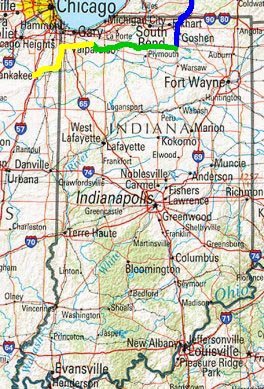
April 27
Indiana. Joe rode 64 miles to Nappanee. The final 20 miles south of Elkhart were through "absolutely beautiful Amish farm country. Horse and buggies everywhere." Joe ate supper in a 100 year old, round, hay barn that been converted into a modern restaurant. The barn is so big it seats 400 people. While Joe was waiting for an interview with the local newspaper, five tour busses pulled into the parking lot. Lots of people tour the Amish Country to see the beauty and simplicity of the Amish way of life.
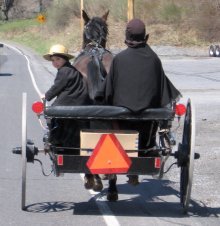
April 28
Joe pedaled 57 miles to Valparaiso. He was interviewed by the local paper. The weather report says cold and rainy for the next few days. This is not what a bicycle rider wants to hear.
April 29
The weatherman was right; cold and rainy. Joe always said he was determined to visit the gravesite of Felix Grundy Stidger when he was in Chicago. Stidger was the man from Taylorsville, KY, who played a major role in saving the U.S. government from a very well organized conspiracy plot during the Civil War. It is important to understand that whenever Joe talks about riding his bicycle into the middle of large metropolitan area, especially to a destination without a designated bicycle path, the official "Worry Committee" goes on high alert. (Not that they have the slightest chance of changing Joe's mind.) But this time, the weather and the schedule worked in their favor. Joe decided to make the best of the situation by renting a car and driving into Chicago to the Stidger site.
April 30
Rained out, again. Joe planned on catching up on his emails and "Stories From the Road" but the laptop computer is down again. The laptop was a brand new, expensive computer purchased at the beginning of the trip. This is the second time it has gone down. Although the Appalachian Heritage Alliance paid for next day, on-site service, it took over a week to get it fixed last time. An important part of Joe's trip is about overcoming obstacles; whether it's a mountain, a desert, long lonely stretches of highway, a faulty computer, or whatever is in the way.
May 1
Rained out, yet again. Fortunately, Joe had a telephone interview with Greg Collard from WV Public Radio's "Inside Appalachia" to keep him busy. "Inside Appalachia" is heard on 32 stations in six states and has followed Joe throughout the trip. Thank you all. Since the computer is down, Joe is writing his "Stories from the Road" entry by hand. This is the way he corresponded during the first trip of 1967-68. On his first trip he wrote 265 letters. This time he has 3000 emails. On the first trip he took 144 pictures. This time he has already taken 13,000.
Illinois
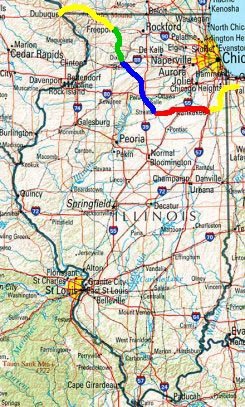
May 2
After three days, Joe was mighty pleased to leave the hotel and get back on the road. Rocinante was glad as well, but truth be told, had not complained nearly as much. They crossed the Illinois border during the 57 mile ride to Kankakee. All the big farm tractors Joe has been watching for the last couple of weeks are silently stuck in the mud. The technicians are trying to track down Joe and fix his computer. This is their first time to locate the address "seat of a bicycle, traveling west at twelve miles per hour."
May 3
About 20 miles out of Kankakee Joe got pulled over by a cop. Joe checked his speedometer and was fairly confident that his rate of ten miles per hour wasn't over the speed limit. The policeman, Hugh Boyt, was just interested in Joe's trip and wanted to talk to him. He told Joe about a better, safer, county road that wasn't on the map. Thanks, Hugh. Along the new road a large Army truck stopped beside Joe. A young man, 27 year old Sgt. Steven J. Richardson, wanted to talk to Joe. Steven was very excited about what Joe was doing. Steven, a National Guardsman, had recently returned from a tour in Iraq. Since he is a mechanic, and the Army is short on mechanics, he has been assigned to return to Iraq next month with another unit. That unit is scheduled to return home just as his regular unit is listed to go back to Iraq. Joe, and all of us, wish Steven, and all our soldiers, a speedy and safe return home. Joe pedaled 58 miles to Streator.

Sgt. Steven J. Richardson
May 4
Twelve hours of pedaling against an 8 to 10 mph headwind brought Joe 70 miles to Dixon. Today, he reached the 12,000-mile mark of the trip. The major agricultural crops across northern Ohio, Indiana, and now Illinois, is corn and soy beans. And lots of it. The corn is now about two inches tall. Joe passed through the town of Ottawa, which has the distinction of hosting the first of the famous Lincoln - Douglas debates in 1858. Slavery was a major point of contention in our country in those days. The tall, thin, Abraham Lincoln spoke eloquently on the moral issue, or more precisely, the immoral issue, of slavery. He contended that "Negroes" should have the same rights to "life, liberty, and the pursuit of happiness" as anyone else. The short, rotund Stephen Douglas-the "little giant"- considered the problem from a political rather than moral viewpoint. Douglas, renowned for his oratory skills, asserted that the newly formed U.S. Territories that were trying to become states, could exclude slavery. Neither of these men were popular in the South. This series of debates was for a Senate seat from Illinois and Douglas won the election. Two years later, both men ran for President and Lincoln won.
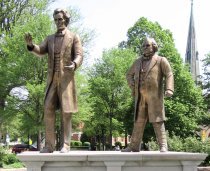
Lincoln - Douglas Debate
May 5
Dixon is the hometown of our 40th president, Ronald Reagan. One of the houses he lived in as a boy is now a museum, which Joe toured. Joe said the people who operate the museum are wonderfully gracious hosts. He also visited the only statue of Abraham Lincoln dressed in a military uniform. Joe estimated the height of the statue to be 12 feet tall above its 8 foot pedestal. Quite impressive. Joe pedaled 40 easy miles through farm country to Freeport.
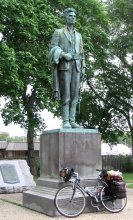
Abraham Lincoln
Wisconsin and Iowa
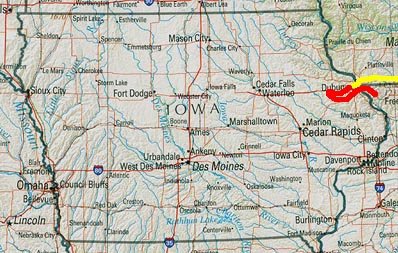

May 6
Joe followed the "Old Stage Coach Road" through rolling countryside. It was a perfect day for bicycling. He crossed the state line and rode through the southwest corner of Wisconsin. The farms are very large and very picturesque. The main crops are still corn and soy beans but he's beginning to see wheat fields. The United States is truly blessed to have so much good farmland and the excellent farmers to work it. The good, rich soil that makes agriculture across this entire region so bountiful was deposited by the glaciers as they retreated during the last ice age. Joe finished the 70 miles of today's ride by crossing the Mississippi River into Dubuque, Iowa.
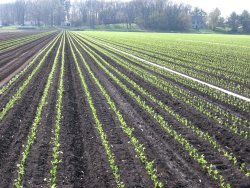
The Good Earth
May 7
If you saw the movie "Field of Dreams" you might recall the saying, "If you build it, they will come." Well, it worked for Joe. When he realized he was only 25 miles from Dyersville, home of the "Field," he decided he had to go see it. The house, baseball field, and cornfield from the movie set are now a tourist attraction. You are welcomed to take your ball, bat, and glove and go play on the "Field of Dreams." And people certainly do. And it's free. Joe pedaled back to Dubuque, crossed the Mississippi River into Illinois, and spent the night in Galena.
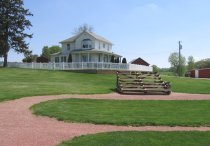
Field of Dreams
Illinois (again)
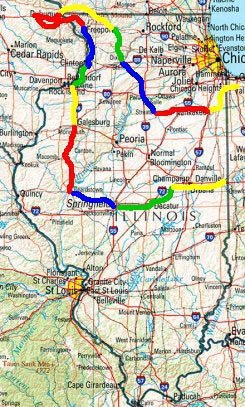
May 8
Joe visited the home of Ulysses S. Grant in Galena. Grant was commander in chief of the Union Army during the Civil War and later became our 18th president. Grant accepted the surrender of Confederate General Robert E. Lee at Appomattox which ended the war. Joe then pedaled into some hilly country along the Mississippi River. One particularly steep section on Black Jack Road was marked with a 15% grade sign; the steepest posted grade sign he's seen on the entire trip. Half of his 50 mile day was ridden on a tree canopied bicycle path along the great Mississippi River. The lilacs are in bloom and folks up there really like their lilacs. Joe says, "the air is perfumed with the scent of lilac blossoms."
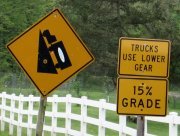
Cascades? Colorado Rockies? West Virginia? Nope. Illinois.
May 9
37 miles to Moline. Five hours riding in the rain. Soaked through and through. That was enough riding for today. On the upside, Joe was interviewed by two newspapers and a TV station. That was fun.
May 10
While Joe was pedaling along today, a lady in a car stopped him. Her name was Chris Fiedler, an art teacher at the Alwood Community School in Alpha. Chris had heard about Joe's ride and wanted to meet him and tell him what a wonderful thing he was doing, especially for the students. She said she had to get back to work immediately but would be honored to buy him lunch, which she did. And now, we have more students involved. Thanks, Chris! While Joe visited the small, four room home (museum,) of the famous poet Carl Sandburg in Galesburg, Kristy, one of the young ladies working there asked Joe if would come to her parent's house for dinner. Later, Kristy and her dad picked up Joe and took him home for one of mom's great home-cooked meals. Thank you, folks, for your hospitality. They told Joe an amusing and entertaining story about a Lincoln-Douglas debate in Galesburg at Knox College. Joe will relate it in an upcoming "Stories from the Road." When Carl Sandburg was a young man, he walked, worked, and hoboed his way across the Great Plains. Joe felt a kindred spirit feeling toward Mr. Sandburg because Joe had taken a similar type journey on his bicycle when he was a young man. We look forward to Joe's next poem.

at Carl Sandburg Museum
May 11
The weather is of far more immediate concern to a bicyclist than it is to those of us traveling comfortably in our cars. On this trip, Joe has ridden in rain, wind, sleet, storm, and snow. The temperature has ranged from freezing in the mountains to well over 100 degrees in the sun baked desert. But who in the world would have thought it would be cold in the mid-west in the middle of May? But it is. Today was windy with the temperature in the 40's. Joe had to put on all the clothes he carries with him. He said bicycling in these conditions is not particularly pleasant but entirely do-able as long as it's not raining. A cold rain lowers his body temperature quicker than the physical exertion of pedaling can keep him warm. He rode 76 miles to Beardstown.
May 12
Please forget everything in yesterday's update about not riding in a cold rain. Joe rode half of today's 58-miles to Springfield in a, you guessed it, cold rain. He stopped in New Salem where Abraham Lincoln lived and went to school as a teenager. His teacher was a Kentucky man called Mentor Graham. New Salem was once a river town but when the river channel changed course, the townsfolk deserted New Salem and moved a few miles to Petersburg. During the late 1930's and early 40's, the Civilian Conservation Corps rebuilt New Salem as a historic site honoring Lincoln. The Illinois state motto is "Land of Lincoln." Joe photographed four more statues of Lincoln in the last couple of days.
May 13
Wayne and Julie, the folks Joe met at Arlington Cemetery and who helped him find the gravesite of our hometown hero, John David Morton, drove from St. Louis, MO, to meet Joe in Springfield. Wayne and Julie are history buffs and very knowledgeable concerning the life and legacy of Abraham Lincoln. They took Joe on a tour of all the Lincoln sites in Springfield. Thank you, folks, for being part of this trip. The visit to the new Lincoln Presidential Library was particularly productive. Joe found two letters concerning the Felix Grundy Stidger case that shows Lincoln's involvement. The historians at the Library are now hot on the trail. And when it comes to Lincoln, these people are very, very, serious. There is a sign in the Lincoln Library that states that more has been written about Abraham Lincoln than any other person in history, with the sole exception of Jesus Christ.
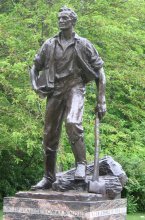
Lots of Lincoln Statues in the "Land of Lincoln"
May 14
Through this part of the country, the story is about corn. Corn, corn, and more corn. Traveling at bicycle speed allows a person to truly contemplate how much corn is produced in this country. Corn, or maize, as it was first called, was developed by Native Americans. They also developed tomatoes, peppers, squash, most of the beans, peanuts, and potatoes. It has been estimated that 60% of the food crops now in cultivation were developed by Indians. In terms of harvest weight, corn is the world's largest crop. Riding a bicycle allows thoughts that would normally be lost in our busy daily schedules to bubble into the conscious mind. And Joe has plenty of time for thoughts to bubble to the top. Today he thought about the time it takes a person to get from here to over yonder. It took him all day to pedal 70 miles. A car could do it in an hour. A jet in 6 minutes. It would have taken the early pioneer families a week. This was just a little "thought bubble" he figured the elementary students might want to think about. He is in Monticello.
May 15
We are quickly approaching the final month of this amazing adventure. Joe has taken us on an incredible ride. Even though Joe is the hero and focal point of this modern odyssey, the journey is not about him. It's about us. Our magnificent country, our good and caring and hard working people from coast to coast. It's about our students learning to appreciate America's story. And what a great story it is. It's also about home and family and community. Our home in Kentucky. Your home wherever it may be. The things that really matter and bind us together as a great nation. And it's also about having fun. Don't forget that! If you have any thoughts about the trip you want to share, please send them to Comments@AppalachianHeritageAlliance.org Joe will certainly appreciate them. We are going to compile a "top ten" list of stories from Joe's "Stories from the Road" section. If you have a favorite story, please let us know what it is. Your thoughts, prayers, and suggestions are always welcome. Today, Joe was rained out.
May 16
And speaking of community; In the mountains of Eastern Kentucky we have a custom that when a funeral procession passes by on the way to the cemetery, cars coming from the opposite direction pull off the road and wait until the procession goes by. This community ritual is a show of respect for the deceased and the grieving family. Today, as Joe approached Danville, a funeral procession came toward him. He stopped, got off his bicycle, took off his helmet, and stood respectfully as the procession passed. Later that evening, a lady approached him and asked if he was the fellow riding the bicycle who stopped during a funeral procession earlier that day. He acknowledged that he was and explained that is what we do in Eastern Kentucky. The lady said the person who died was her aunt and that all the family had seen a guy on a bicycle standing in respect as they passed by. It touched them deeply and she was so glad to have the opportunity to thank him, a stranger, for such a simple, but meaningful, act of kindness. Joe rode 56 miles to Danville.
Next Stage: Indiana (again), Ohio (again), Indiana (again, again)
